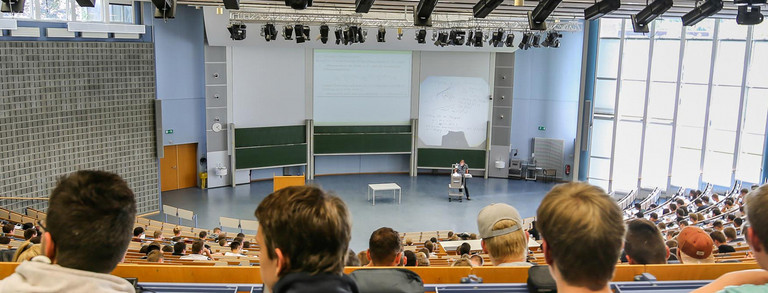Continuing your studies
After careful consideration as to whether you have chosen the right degree program, your answer could be "yes". In this case, there are various ways to ensure your academic success (sustainably) and to support your course of study.

Support services
If you have any questions or difficulties during your studies, there are various contact persons at TU Dortmund University to help you
In a discussion with the advisors at the General Student Advisory Service, you can confirm your choice of study and develop an individual strategy to continue and complete your studies in a motivated and successful manner. Here you will not only receive tips on how to organize your studies effectively, but also information on the relevant contact points, for example to take measures to promote motivation and to explore professional fields in your subject and career opportunities.
The counselors at the Psychological Student Advisory Service support you in overcoming study-related or personal challenges and problems. This can mean, for example, clarifying study doubts, overcoming exam nerves, reactivating resources or expanding skills. You have the following options in this context:
- You can attend the consultation hours if you have study-related problems or find yourself in difficult life situations and cannot see a way out on your own. You can discuss your individual problems in a trusting and respectful atmosphere and find new perspectives together.
- In the coaching groups , the challenges of studying on various topics such as exam anxiety or procrastination are discussed in a resource-oriented and evidence-based manner and skills for dealing with them are developed.
- In lecture series , you will receive impulses and suggestions on topics such as time management, learning strategies, feelings and burnout prevention.
- The writing workshop provides you with targeted support when writing your Bachelor's, Master's or seminar paper. You will meet experts on topics such as correct argumentation and citation, researching literature and overcoming writer's block and can exchange ideas with fellow students.
- Student advisors
A look at possible career fields and personal career goals can significantly increase your motivation to study. The student advisors will be happy to advise you on exploring possible careers. In addition, the departments at TU Dortmund University offer various career planning services. On the one hand, you will find job advertisements that show what is expected of you as a graduate in your everyday work and in your application. In addition, you will be referred to various job exchanges or can attend information events on possible career fields in some departments. It is worth taking a look at the pages of your department to find out what is on offer.
- stellenwerk TU Dortmund University
At stellenwerk TU Dortmund University, you will find offers for application training as well as a job exchange with advertisements for entry-level positions, internships and working student jobs. This will give you an insight into career opportunities and requirements in your field.





![[Translate to English:] Partner Four hands are holding the green logo of TU Dortmund University](/storages/tu_website/_processed_/1/d/csm_Partner_Nicole_Rechmann_KW_670eba0154.jpg)




![[Translate to English:] Forschung An apparatus with tubes in a laboratory](/storages/tu_website/_processed_/0/c/csm_Forschung_Juergen_Huhn_4fa3153b51.jpg)
![[Translate to English:] Studium Five students are sitting in a lecture hall. They are talking to each other.](/storages/tu_website/_processed_/c/9/csm_Studium_FelixSchmale_dbdbfb0dd7.jpg)







